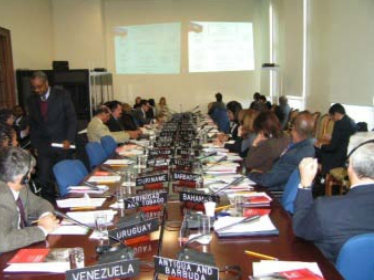
On December 8-9 2010, a specially mandated working group of Organization of Americas States (OAS) members met in Washington D.C. to discuss ways to strengthen regulatory frameworks for disaster cooperation in the Americas.
The “Joint Working Group of the Permanent Council and the Permanent Executive Committee of the Inter-American Council for Integral Development (CEPCIDI) on Existing Mechanisms for Disaster Prevention and Response and Humanitarian Assistance” was tasked by the OAS General Assembly last year to develop recommendations for improving disaster cooperation in the Americas. In this most recent meeting, the group turned to the IFRC for technical support in examining the legal issues related to relief operations in the region.
A number of member states contributed their experiences in receiving international disaster assistance. The IFRC, along with several National Societies of the region, were invited to present on the most common regulatory problems as well as best practices adopted by states globally.
On a panel aimed at identifying “regulatory problems”, the government of Haiti, along with the Haitian Red Cross, presented on its recent and current experience as a receiving country following the earthquake of January 12, 2010. Nadia Lochard, Head of Civil Protection for the Interior Ministry in the Western Department of Haiti pointed out a number of steps that the Haitian authorities had taken to facilitate incoming assistance, including the development of a reception team at the airport. She noted that “international actors did not have a good knowledge of the existing laws and procedures in place” but also acknowledged that Haiti needs to strengthen its current regulatory framework for international assistance in anticipation of future disasters.
For its part, the government of Dominican Republic presented on its experience as transit state following the Haiti earthquake, the government of Peru shared experience and lessons learned following the massive international assistance to the Pisco earthquake of August 2007, and the Federal Emergency Management Agency, along with American Red Cross, presented on their experience of managing international offer of assistance following Hurricane Katrina. “Over 150 nations and international organizations offered financial or material assistance to support relief efforts following Hurricane Katrina” claimed Dominick Pillot from FEMA, “we were not prepared to handle international offers for assistance”.
Governments of the region also presented on “regulatory solutions” to the problems identified. As such, the Government of Argentina was invited to present on its domestic legal framework that would apply to the entry of goods and personnel following a disaster. For its part, the Colombian Red Cross presented on its work in support to the government of Colombia to strengthen its legal preparedness in view of international disasters “We need to improve how we receive international assistance, how we provide international assistance, and how to cooperate with others in providing international assistance” stated Walter Cotte, National Director of the Colombian Red Cross.
The members stated also opened dialogue on the Inter-American Convention and the pertinence to update this tool or create a new one to strengthen disaster assistance in the region. In the first quarter of 2011, the member states will propose, based on the outcome of the meetings of the Working Group, recommendations and steps of action with a view to enabling the coordinated, efficient, and expeditious delivery of humanitarian assistance in natural disaster cases.